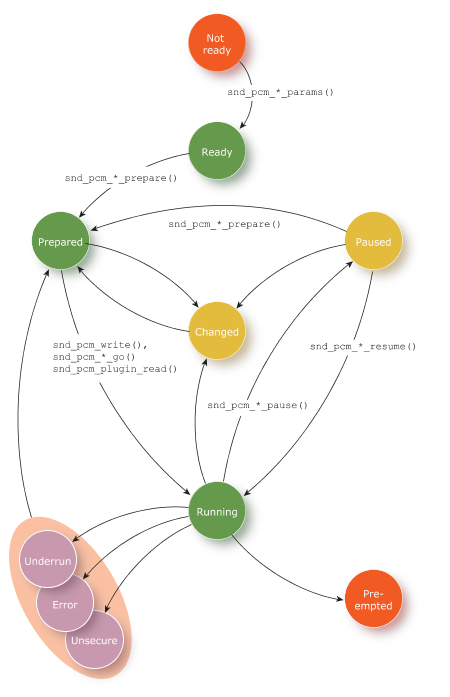Let's consider the state transitions for a PCM device during playback.
 Figure 1. State diagram for PCM devices during playback.
Figure 1. State diagram for PCM devices during playback.In the figure above, the oval groups the Underrun, Error, and Unsecure states together to indicate that each state can transition to the Prepared state
The transition between SND_PCM_STATUS_* states is the result of executing an API call, or the result of conditions that occur in the hardware:
| From | To | Cause |
|---|---|---|
| NOTREADY | READY | Calling snd_pcm_channel_params() or snd_pcm_plugin_params() |
| READY | PREPARED | Calling snd_pcm_channel_prepare(), snd_pcm_playback_prepare(), or snd_pcm_plugin_prepare() |
| PREPARED | RUNNING | Calling snd_pcm_write() or snd_pcm_plugin_write() |
| RUNNING | PAUSED | Calling snd_pcm_channel_pause() or snd_pcm_playback_pause() |
| PAUSED | RUNNING | Calling snd_pcm_channel_resume() or snd_pcm_playback_resume() |
| RUNNING | UNDERRUN | The hardware buffer became empty during playback |
| RUNNING | UNSECURE | The application marked the stream as protected, the hardware level supports a secure transport (e.g., HDCP for HDMI), and authentication was lost |
| RUNNING | CHANGE | The stream changed |
| RUNNING | ERROR | A hardware error occurred |
| UNDERRUN, UNSECURE, CHANGE, or ERROR | PREPARED | Calling snd_pcm_channel_prepare(), snd_pcm_playback_prepare(), or snd_pcm_plugin_prepare() |
| RUNNING | PREEMPTED | Audio is blocked because another libasound session has initiated playback, and the audio driver has determined that that session has higher priority |
For more details on these transitions, see the description of each function in the Audio Library chapter.